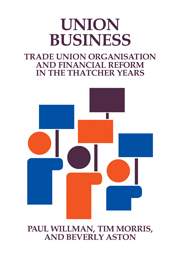Book contents
- Frontmatter
- Contents
- Acknowledgements
- 1 Introduction: unions in the 1980s
- 2 The financial status of British trade unions 1950–1989
- 3 Financial differences between unions
- 4 The role of financial matters in union organisation
- 5 The politics of union finaces
- 6 Union size, growth, and financial performance
- 7 Strike activity and union finances
- 8 The National Union of Mineworkers: strikes and financial disaster
- 9 The GMB: merger and financial reform
- 10 The Amalgamated Engineering Union: back from the brink
- 11 The Banking, Insurance and Finance Union: competitive unionism and financial survival
- 12 The Electrical, Electronic, Telecommunications and Plumbing Trade Union: accountability and financial control
- 13 Conclusions: union business and business unionism
- Appendix 1 Research methods
- Appendix 2 Regression results
- Appendix 3 Questions for finance officers
- Appendix 4 Questions for General Secretaries
- Appendix 5 Questionnaire: trade union finances
- Appendix 6 The number of trade unions
- Notes
- References
- Subject index
- Index of trade unions
- Author index
4 - The role of financial matters in union organisation
Published online by Cambridge University Press: 11 March 2010
- Frontmatter
- Contents
- Acknowledgements
- 1 Introduction: unions in the 1980s
- 2 The financial status of British trade unions 1950–1989
- 3 Financial differences between unions
- 4 The role of financial matters in union organisation
- 5 The politics of union finaces
- 6 Union size, growth, and financial performance
- 7 Strike activity and union finances
- 8 The National Union of Mineworkers: strikes and financial disaster
- 9 The GMB: merger and financial reform
- 10 The Amalgamated Engineering Union: back from the brink
- 11 The Banking, Insurance and Finance Union: competitive unionism and financial survival
- 12 The Electrical, Electronic, Telecommunications and Plumbing Trade Union: accountability and financial control
- 13 Conclusions: union business and business unionism
- Appendix 1 Research methods
- Appendix 2 Regression results
- Appendix 3 Questions for finance officers
- Appendix 4 Questions for General Secretaries
- Appendix 5 Questionnaire: trade union finances
- Appendix 6 The number of trade unions
- Notes
- References
- Subject index
- Index of trade unions
- Author index
Summary
Introduction: why should trade unions care about money?
Those who have concerned themselves with the economics of trade unions have often not been concerned with their internal structure. Most economists are concerned with the economic impact of trade unions, particularly on absolute and relative wages, on profitability or on labour productivity (see Hirsch and Addison, 1986). When economists ask the question, ‘what do unions do?’ they are less concerned with union activity itself than with such consequences (Freeman and Medoff, 1984) and a concern with the effects of trade unions does not require an economic model of trade union organisation.
By contrast, those who have concerned themselves with the internal structure of unions have not generally been concerned with economics. The attention paid to trade unions by sociologists and by those in the more descriptive British industrial relations tradition has encompassed union government and democracy, the relationship between ‘formal’ trade unions and lay representation, the factors which encourage or discourage merger and the relations between unions and government, but not the economics of union organisation. For example, Undy et al.'s (1981) discussion of change in British trade unions focuses on the degree of centralisation of decision making and on the role of union general secretaries. It has little to say on the role of resource constraints in enforcing change in British trade unions between 1960 and 1975, other than to remark upon certain circumstances, notably merger negotiations, where resource considerations are important.
- Type
- Chapter
- Information
- Union BusinessTrade Union Organisation and Financial Reform in the Thatcher Years, pp. 34 - 54Publisher: Cambridge University PressPrint publication year: 1993



